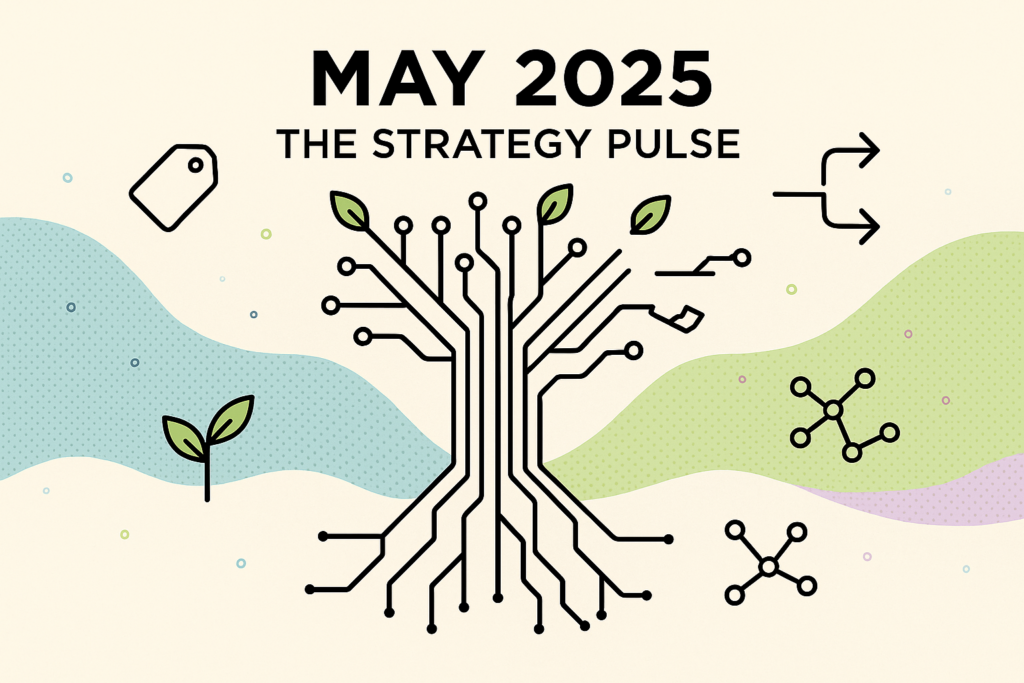Month: June 2022

Data Digest #1: Collapsing Cookies and Resurrecting Relatives
Data Digest #1: Collapsing Cookies and Resurrecting Relatives
June 29, 2022

The cogs of the data world are perpetually turning. Data never sleeps. That’s why we’ve decided to bring you a shiny, brand-new monthly newsletter, dedicated to summarising some of the most pressing news stories that have been making waves on the data scene over recent weeks. Brace yourself for an exciting overview of some of the top data news stories that have been gracing our screens lately.
Forbes: Clean Rooms
Third-party cookies are gradually fading into the background of the data scene, becoming a mere fragment of the past. Third-party data is often clogged with irrelevant information, and the user may not have explicitly consented to passing over this data. For companies, handling third-party data is a legal minefield fraught with booby traps and distractions. Due to new user protection and privacy laws, third-party data needs to be thoroughly cleaned and filtered through. This is also necessary in order to ensure that data being collected is streamlined and useful, thus it can be leveraged by a company in order to improve the customer experience. If only there were a technology that could clean data…
Enter clean rooms. This technology seeks to filter through the noise and find the customer right customer data that aligns with privacy laws. However, clean rooms are not an airtight model. There are a few faults to the system. There are many types of clean rooms out there to choose from, and there’s also a discrepancy between privacy policies and laws in different industries. These two factors combined make navigating clean rooms and third-party data feel like trying to decipher a jumbled-up jigsaw puzzle. This is why it’s wise to steer-clear of third-party data altogether, and stick to the far more reliable first-party and zero-party data as much as possible. When the data source is high quality from the get-go, there’s less room for error. First and zero-party data is derived from a direct relationship with the customer; the company proactively reaches out to them, via survey for example, and they provide you with specific information. This type of data is vital when it comes to building out a positive customer journey from a marketing perspective.
Clean rooms have the capacity to serve as an indispensable tool. But in order to truly get the most out of this technology, companies need to be collecting the right kind of data from the outset. Leveraging information that comes from first and zero-party sources ensures that the data being cleaned is not polluted from the get-go, thus cutting out a huge chunk of confusion and complication from the process.
Forbes, Are Clean Rooms the Answer to Data Privacy and a Killer Customer Experience?
The Guardian: Roe v Wade Overturned, User Data at Risk
Last week, the US was shook to its very foundation by the decision of the Supreme Court to overturn Roe v Wade; a decision which has already led to an outright ban on abortion in a significant number of US states. In the wake of this news, pro-choice and civil rights activists have called upon tech companies to secure user data against the government.
There’s concern over data privacy laws, as there’s every chance that law enforcement officials may issue subpoenas to tech companies in order to access ‘evidence’ to support abortion prosecutions, such as internet searches and communication history. There have already been instances of this happening; one woman’s internet search for abortion pills was used against her as evidence in court. This is a worrying and distressing prospect, and yet many tech giants are yet to reassure their users that their data will remain private and out of the hands of law enforcement officials. Meta and Uber are just two of the companies who still haven’t commented or issued a statement on the subject.
Many activists are also concerned about the data being collected via period tracking apps. Warnings have been circulating online and going viral for users to delete their tracking apps, in case the government is able to access information about a woman’s reproductive health as a method of surveillance. Many of these smaller tech companies, such as period tracking app Clue, have responded to these concerns in a bid to reassure their users. Activists are currently advising tech companies to retain as little personal data on their users as possible in order to keep them anonymous, should law enforcement officials attempt to get their hands on company data. Many tech firms are in the process of trying to navigate this complex dilemma, in order to protect their users and keep their data private.
The Guardian, Tech Firms Under Pressure to Safeguard User Data as Abortion Prosecutions Loom
BBC: The Downfall of Cookies
By now, we’re all too well-acquainted with those pesky cookies that pop-up on websites every time you visit. We’ve simply gotten used to them; they’re part and parcel of using the internet nowadays. However, this could all change in light of the UK government’s proposed reforms to data privacy. As it stands, users are asked to consent to the use of cookies on every website they visit. Cookies track what you get up to on the website, which websites you visit after you leave, and your location, amongst other things. By leveraging this information, companies can tailor bespoke adverts for each individual user who visits the site. This permits users to access many websites for free, as advertisements act as their funding source.
The UK government is planning to overhaul this system, replacing it with a single data privacy setting on the overarching browser rather than on the granular level of each individual website.
Reactions to this plan have been mixed. Whilst Culture Secretary Nadine Dorris claims that the plan would be ‘cementing post-Brexit Britain’s position as a science and tech superpower’, privacy activists are less than convinced. The plan is still unclear and there is no strategy set in stone, but there are whispers of an ‘opt out’ button as opposed to an ‘opt in’ option, which, in the eyes of many privacy campaigners, is highly unethical and sneaky, as it makes it the user’s responsibility to prevent themselves from being tracked. There is still no concrete blueprint for the new policy; it’s still very much up in the air. It’s likely that it will be a while yet before any major shift in data privacy and cookie policy materialises.
BBC, Can Crumbling Cookies Sweeten UK Data-Protection Plans?
The Wall Street Journal: Can Insurers Leverage Data to Predict and Prevent Storm and Flood Damage?
For the past six years, Atlantic hurricane activity has gone through the roof, reaching all-time highs. As we edge towards this year’s hurricane season, which spans June to November each year, insurers are gearing up for any potential losses by turning to data analysts and climate scientists, whose foresight they hope will better prepare them for the inevitable storm and flood damage to come.
Many new technologies and tools are proving to be pivotal in the run-up to hurricane season. One particular technology blends aerial images with machine learning in order to gauge the flood risk associated with each individual building at granular level, as some buildings on the same street may be more vulnerable than others. This information provides insurers with a deeply accurate foresight, which they can pass onto their clients in order to help them better prepare and prevent as much potential loss as possible. Last year’s Hurricane Ida demonstrated just how costly heavy flooding can be; it resulted in $36 billion in insured losses, and thus better modelling for the future is the key to avoiding such heavy damages.
Insurers are collaborating with data analysts and climate scientists to develop a more robust system in preparation for hurricane season. If clients are able to make substantial changes or preparations before the flood or storm strikes, insurers will not have to pay out as much in the aftermath. It’s a win-win for both company and client. Nowadays, with more instances of extreme weather than ever before, insurers need to adapt along with our changing climate in order to support their clients in the long-run.
The Wall Street Journal, Insurers Harness Data to Help Clients Weather Storms, Floods
Analytics Insight: Alexa Bringing Dead Relatives to Life
Just when we thought Alexa’s conversation abilities couldn’t get any better, something incredible happens. Alexa is no longer simply a virtual assistant who plays music on request or tells you the weather; it’s now capable of mimicking voices, including those belonging to the dead. Yes, you heard that right. Alexa can imitate the voices of deceased loved ones. Whilst the Bluetooth speaker has not yet released this new offering, it’s very much in the works as we speak. AI is developing at a rapid pace in every industry nowadays, and Amazon have no intention of being left behind. This latest development will be made possible by voice data accumulated from recorded audio, combined with Alexa’s advanced voice recognition algorithm.
It’s a controversial move, without a doubt. Some find the prospect creepy, probably feeling as if they’ve fallen into a dystopian near future that resembles the world of Kazuo Ishiguro’s novel Klara and the Sun, where grief is subverted by using robots to replace loved ones. However, many people are ushering in the development with open arms. A lot of users are excited by the prospect, seeing it as an opportunity to bring memories back to life and reconnect with deceased loved ones in an intimate and poignant way.
Analytics Insight, “My dead grandmother read me a bedtime story”, Alexa Made It Possible

Conversation with a Consultant – Hannah Hutchings
Conversation with a Consultant – Hannah Hutchings
June 16, 2022

Introducing Hannah, recently promoted consultant on our research team!
So Hannah, why did you decide to go into recruitment?
Whilst working in hospitality, travelling and volunteering, I realised I really enjoyed talking to new people and building rapport and relationships. A big part of recruitment is finding out what makes people tick, reading between the lines and understanding what they are looking for next in their career – I feel like this aligned well with what I enjoy.
Also, it is what you make it to be! If you put in the work then you see the results which is really rewarding.
And what drew you to Nicholson Glover as a company in particular?
I knew I wanted to work at a smaller company where you have direct contact with Directors and your whole team. I thought I would learn best in this environment where the training is hands on and getting stuck into calls from day one. Nicholson Glover is exactly like that. You are learning through doing and from your mistakes.
How have you found your experience here so far?
Nicholson Glover is a lovely place to work and absolutely exceeded my expectations! The team is a great mix of competitiveness and pushing you to do better and get things done. But also, supporting you in learning the recruitment industry and giving advice if you are in a new difficult situation. Overall, is a really collaborative workplace where you can learn so much every day.
Any advice for newcomers considering a career in recruitment?
Speak to different companies when you are interviewing. There are a lot of recruitment companies out there, that are different sizes but also covering a variety of industries and markets. It will definitely give you a better idea about what you are looking for and what you prefer. Also, learn about the pros and cons of recruitment. It isn’t always going to go your way and you have to be able to work independently at times which some people may not enjoy.
Have there been any highlights to your time here?
Making my first deal was definitely a highlight! Knowing that you are able to get something over the line is a great feeling.
Anything you didn’t expect about the role?
The role is quite like what I thought it was going to be, but more extreme than I thought? People are very unpredictable! There are so many factors out of your control that can change someone’s mind which makes for an exciting but more difficult deal.
Funniest or strangest thing you’ve seen on a CV?
There are always some quirky things, funniest is probably when there are some very staged or posey photographs! I also always find it interesting to read about some of the rogue and unconventional hobbies people have!
Your lowest moment on the job?
There are lots of highs and lows in recruitment. I think a low point was when a candidate accepted an offer and then went back and changed their mind. Obviously, it doesn’t feel great but I found that most the important thing was to try and learn from the experience and not let it demotivate me.
What’s your go-to drink on the monthly team social?
G&T… always a safe bet!

A guide to handing in your notice
A guide to handing in your notice
June 14, 2022

Handing in your notice is no easy feat.
Before you ride off into the sunset with your sparkly new dream job waiting on the horizon, you are obligated to bid adieu to your current employer, informing them of your decision to pursue an opportunity elsewhere.
The prospect of handing in your notice may, for some, elicit euphoric excitement. Perhaps you’ve been waiting for this moment, like a child counting down the days until Christmas. If you’ve been particularly unhappy in your role for a while, it may seem like this is the opportunity for you to express your grievances and air your frustrations, before dropping the mic and strutting out of your workplace in slow motion like a scene in a Hollywood movie.

Or perhaps you’re totally and utterly dreading it. If you’ve had a positive experience at your current place of employment, it can be difficult to break the news to your team. Preparing to hand in your notice feels like gearing up to break up with a long-term partner.
Either way, whether you love or loathe your current station, it’s important that you approach your resignation tactfully. Even if you despise your boss, avoid causing a scene when you hand in your notice. Handle the situation respectfully, so that you don’t run the risk of burning any bridges.
And if you’re avoiding that uncomfortable conversation with your boss like the plague because it feels like a personal betrayal, don’t fret. There are ways to make the process as painless as possible, but like a plaster that needs to be ripped off, you just need to get it over with. You can’t avoid it forever.
Handing in your notice is uncomfortable but unavoidable. It’s wise to go into that meeting armed with some best practices to ease you in.
Timing is paramount
You need to choose the optimal time to hand in your notice – timing is key. Don’t make the mistake of letting your boss know first thing on Monday morning; this will set the tone for the week, and may cause an awkward atmosphere to set in. Prime time to schedule a meeting is at the end of the day, when most people have dispersed from the office and your boss is most likely free to have a chat, as they have no other meetings arranged for the day. Doing it on a Friday gives your employer time to process your news, as the weekend serves as a cooling-off period.

Obvious as it may sound, you also need to be tactical about who you hand in your notice to. If you work at a larger corporate company, you most likely answer to a line manager who could be the first point of call when it comes to resigning, or else you may need to report directly to an HR department. At smaller businesses, you most likely will be breaking the news to the director.
Crucially, make sure you carve out a meeting with the person you report to, and avoid telling your co-workers about your plans to leave before you’ve had that all-important conversation with your employer. The last thing you want is for the news of your departure to be spreading like wildfire, the talk of the town that becomes an office game of Chinese whispers. Your boss may find out from them before they have the chance to hear it from you.
Stick to your guns
When you walk into your employer’s office, you may be feeling unsure of yourself, and anxious about the uncomfortable conversation that awaits. However, it’s important to give yourself a little pep talk as you brace yourself for this moment, and don’t let yourself be swayed by anything your boss may throw your way. Make sure that your reasons for leaving are cemented in your mind so that you won’t fold under the pressure if your boss presents you with a counter-offer. You had strong enough convictions to pursue other opportunities in the first place, so don’t lose sight of these now.
Make sure you have a pre-prepared set of reasons for leaving that you can tell your boss. But talk in terms of why the opportunity you’re leaving for is one you cannot refuse, rather than mentioning the pitfalls of your current role. You don’t want to leave the door open to negotiation, or give your boss the chance to present you with a counter-offer that seems to resolve everything. You need to make a mental note of some solid reasons for leaving that you cannot get at your current employer, so that they can’t tempt you by dangling a counter-offer in front of you.
Stick to your guns. You can’t let yourself be clouded by a sense of loyalty. Handing in your notice can be an incredibly difficult thing to do as it’s hard to separate emotion from this albeit professional decision, especially if you have a strong working relationship with your employer. But ultimately, you need to put yourself first.

Don’t bare all
If you’ve had a bad experience working at your current company, it’s best to steer clear of airing your grievances in any great detail to your boss. Keep the conversation professional; divulging all could burn bridges which you may come to regret in the future. It’s important to strike the right balance between remaining firm and standing by your convictions as well as staying polite and respectful.
And when it comes to writing a resignation letter, the same rules apply. Keep things short and sweet, and relatively vague. Your letter should reference your current role, and should include your notice period and the last day you will be working. No more, no less. You don’t need to compose a rambling soliloquy documenting all the negative experiences you’ve had working there. Less is more.
A safety net to fall back on
It’s advisable that you have a new job lined up before resigning from your current place of employment. Not only is this a practical safety net for you to fall back on once your employment is terminated, it’s also a light at the end of the tunnel that is something to look forward to, and can make the process of handing in your notice a little less daunting. Handing in your notice isn’t much fun; it’s a stumbling block that arises on the racetrack in front of you, but if you can see your dream job opportunity waiting at the finish line, it doesn’t seem as insurmountable as it otherwise would.
Having a new job waiting in the wings ensures a cushiony, soft landing once you’ve resigned from your current role. You don’t want a vacuum on your CV to appear when you leave your current job. Be sure that the offer you’ve received is set in stone; ask for the offer to be made in writing so that there’s no chance that it falls through last minute. It’s also crucial that your new employer is aware of your notice period so that you can set up a start date that works best for you.
Quitting your job doesn’t have to be an awkward and unpleasant experience. By following these best practices, you’ll be making the transition from one job to another as seamless and painless as possible.

